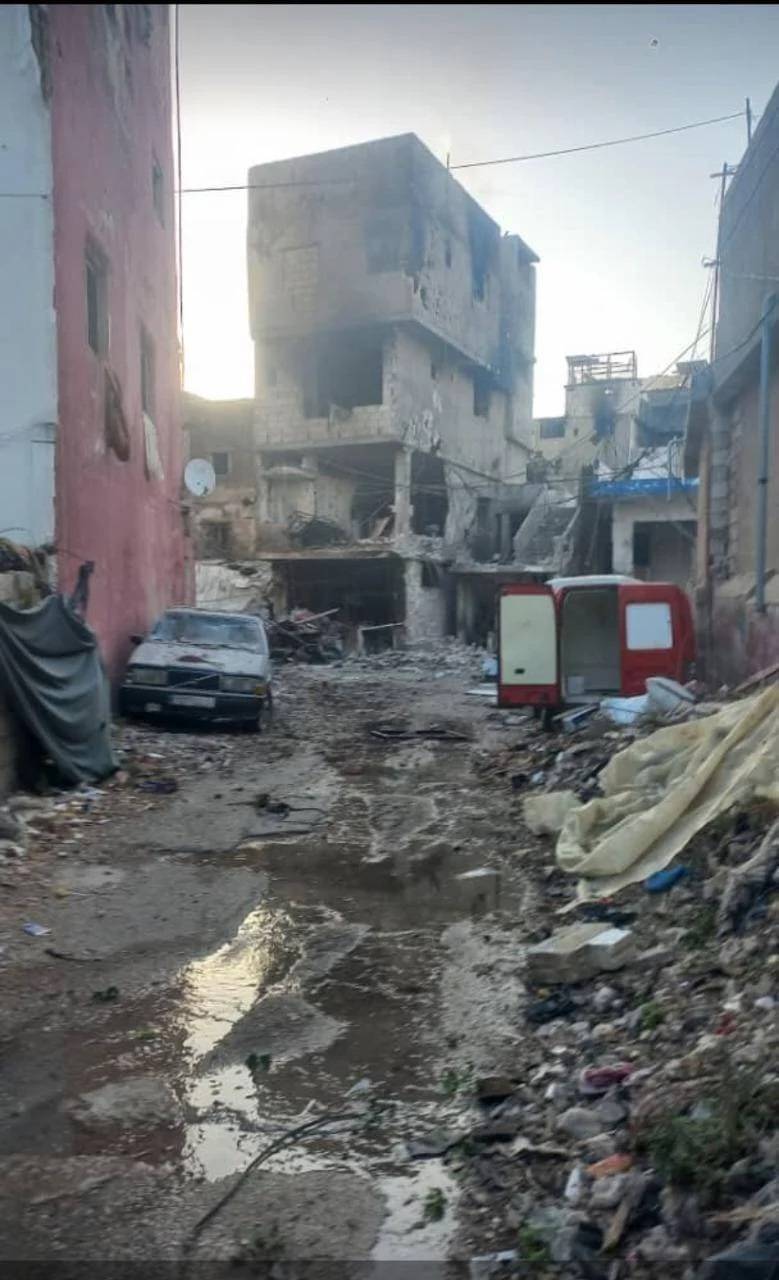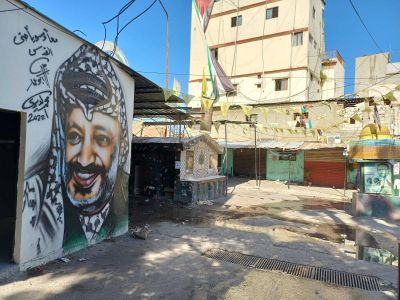
Destruction in Ain al-Hilweh camp after armed clashes between Palestinian rival groups. (Courtesy of: Muntasser Abdallah/L'Orient Today)
BEIRUT — A precarious calm prevailed on Thursday in Ain al-Hilweh, Lebanon's largest Palestinian refugee camp on the outskirts of Saida, in southern Lebanon.
In the early evening, a member of a radical Islamist group involved in the recent days' conflicts was killed after being shot in the abdomen by sniper shots from an unknown source, our correspondent reported, citing Palestinian sources.
This raises the total number of people killed since the beginning of the clashes to 13.
Clashes had resumed on Wednesday evening between Islamist factions and Fatah, entrenched in the Baraksat neighborhood near the northern entrance of the camp.
Numerous injuries and at least one death were reported during the overnight violence, a Fatah source told L'Orient Today. However, since Thursday morning, the ceasefire appeared to hold.
A meeting was organized at the Palestinian Embassy in Beirut on Thursday afternoon between various Palestinian factions in an attempt to enforce the ceasefire, which had been repeatedly violated since Monday, L'Orient Today's correspondent in South Lebanon reported.
A fact-finding commission composed of representatives from several Palestinian groups also began its work to shed light on the events in the camp.
Simultaneously, the Joint Palestinian Action Committee met Thursday and called "for respecting the ceasefire and bringing the culprits to justice," in a statement read by the Secretary-General of the Palestine Liberation Organization (PLO), Fathi Abou Aardate.
No return guaranteed
As for the camp residents who were displaced by the violence, "their return is not guaranteed at the moment," according to Abou Aardate.
Some residents ventured into the camp on Thursday to retrieve personal belongings or inspect their homes, our correspondent reported.
In a phone call with Lebanon's caretaker Prime Minister, Ismail Haniyeh, head of the Hamas political bureau, pleaded Mikati to "make greater efforts to consolidate the ceasefire and restore order," according to a statement issued by the Palestinian party. Haniyeh insisted on "security and stability in the camp and its surroundings (...) and that Palestinian weapons be directed only against the Zionist enemy."
Haniyeh also stressed the need to "respect the decisions taken by the Palestinian authorities, in particular the Joint Palestinian Action Committee, in coordination with the relevant Lebanese authorities, not to resort to arms, to implement a ceasefire, to remove fighters from the streets and to give the investigation commission a chance to carry out its work in coordination with the relevant state authorities."
'Panic among the Lebanese'
Mikati also spoke with President of the Palestinian Authority Mahmoud Abbas by telephone on Thursday, according to a statement issued by his press office, as well as with Palestinian Ambassador to Lebanon Ashraf Dabbour and a member of the PLO Executive Committee, Azzam Ahmad.
During these contacts, Mikati reiterated "the Lebanese government's request to the Palestinian factions to cease the fighting, which constitutes a blatant violation of Lebanon's sovereignty, especially as the Lebanese have always supported the Palestinian cause."
"It is unacceptable that the Palestinian factions should engage in such bloody clashes and sow panic among the Lebanese, especially the inhabitants of the South who have welcomed them for many years. The army and other security services will do what they have to do to preserve security and put an end to the fighting," he added.
Nasser Kanani, a spokesman for Iranian diplomacy, on Thursday called for a cessation of hostilities in Ain al-Hilweh, in remarks reported by the official Iranian news agency, Irna. Kanani insisted that the Palestinian cause requires, more than ever, unity and solidarity among Palestinians.
"Palestinian groups and movements, as well as the Palestinian nation, should use their capacities and resources to fight the Zionist occupation, which is the cause of all the Palestinians' difficulties and instability in the region," he said.
Since Saturday, Ain al-Hilweh, Lebanon's largest Palestinian refugee camp, has been the scene of armed clashes between Islamist factions and the Fatah Movement, present in the Baraksat area near the camp's northern entrance.
Abu Ayad al-Chaalan, the new Fatah-affiliated security chief in the camp, told L'Orient Today on Wednesday that he believes Islamist militant Bilal Badr, "who works with Daesh" (Arabic acronym for the Islamic State terrorist group) was behind the assassination of his predecessor, Abu Ashraf al-Armouchi, who was killed in the camp on Sunday.
A ceasefire was announced on Monday evening but has been repeatedly violated.
Around 350 families have fled the fighting to Saida, near the camp.
Ain Al-Hilweh is home to over 54,000 registered Palestinian refugees who have been joined in recent years by thousands fleeing the civil war in Syria.
The densely populated camp is regularly the scene of clashes due to personal disputes and tension between various Palestinian factions. Saturday's clashes were the deadliest in several years.
